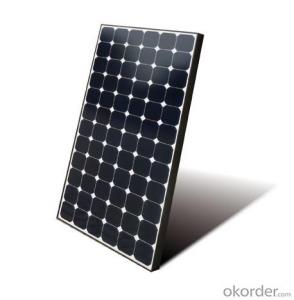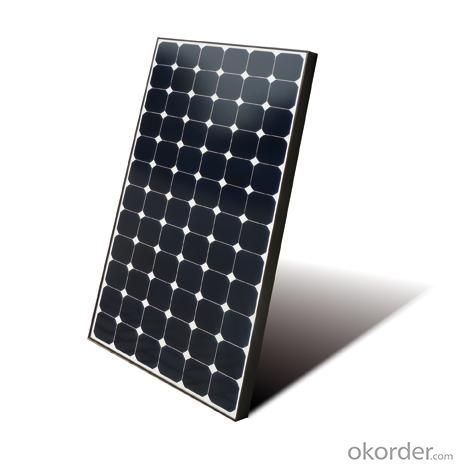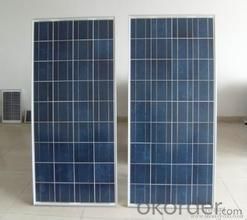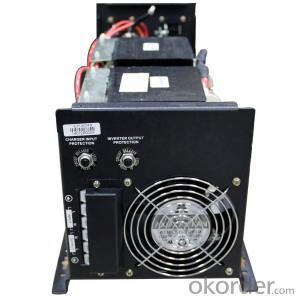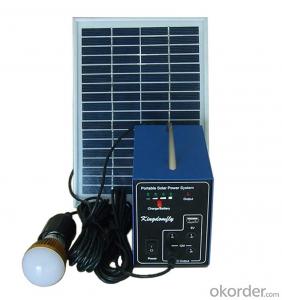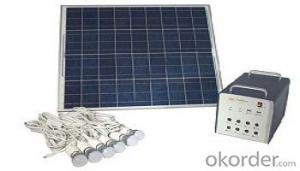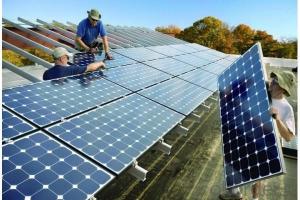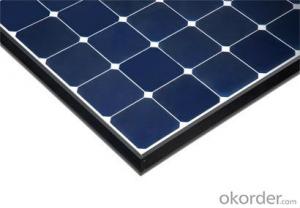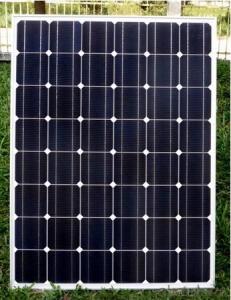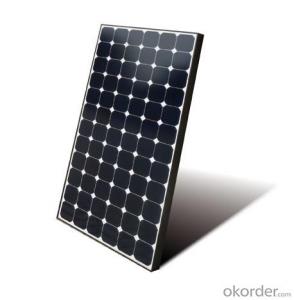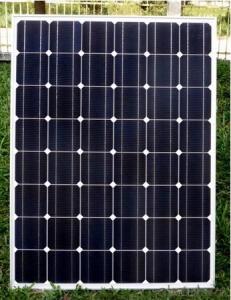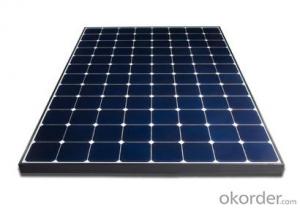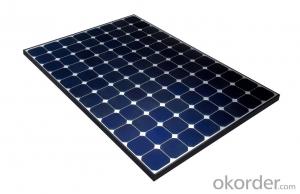Solar Energy Systems Utah - CNBM On Grid System 600W with Certificate UL TUV CE
- Loading Port:
- Shanghai
- Payment Terms:
- TT OR LC
- Min Order Qty:
- 100 watt
- Supply Capability:
- 1000 watt/month
OKorder Service Pledge
OKorder Financial Service
You Might Also Like
Specification
CNBM On Grid System 600W with Certificate UL TUV CE
Product description
A grid-connected photovoltaic power system, or grid-connected PV system is anelectricity generating solar PV system that is connected to the utility grid. A grid-connected PV system consists of solar panels, one or several inverters, a power conditioning unit and grid connection equipment. They range from small residential and commercial rooftop systems to large utility-scale solar power stations. Unlike stand-alone power systems, a grid-connected system rarely includes an integrated battery solution, as they are still very expensive. When conditions are right, the grid-connected PV system supplies the excess power, beyond consumption by the connected load, to the utility grid.
Connection of the photovoltaic power system can be done only through an interconnection agreement between the consumer and the utility company. The agreement details the various safety standards to be followed during the connection.[4]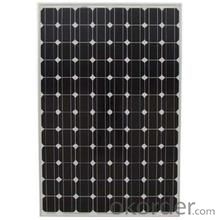
Application
Industrial
Commercial
Residential
Feature
Residential, grid-connected rooftop systems which have a capacity more than 10 kilowatts can meet the load of most consumers.[2] They can feed excess power to the grid where it is consumed by other users. The feedback is done through a meter to monitor power transferred. Photovoltaic wattage may be less than average consumption, in which case the consumer will continue to purchase grid energy, but a lesser amount than previously. If photovoltaic wattage substantially exceeds average consumption, the energy produced by the panels will be much in excess of the demand. In this case, the excess power can yield revenue by selling it to the grid. Depending on their agreement with their local grid energy company, the consumer only needs to pay the cost of electricity consumed less the value of electricity generated. This will be a negative number if more electricity is generated than consumed.[3] Additionally, in some cases, cash incentives are paid from the grid operator to the consumer.
Packaging
With carton and box
- Q: Can solar energy systems be used for powering outdoor appliances?
- Yes, solar energy systems can be used for powering outdoor appliances. Solar panels can be installed in outdoor areas to capture sunlight and convert it into electricity, which can then be used to power various appliances such as lights, fans, pumps, or even outdoor entertainment systems. This allows for a clean and sustainable energy solution for outdoor activities.
- Q: How does the angle and orientation of solar panels affect their efficiency?
- The angle and orientation of solar panels greatly impact their efficiency. Solar panels should be angled and oriented in a way that maximizes their exposure to sunlight throughout the day. If the panels are not angled correctly, they may not receive the maximum amount of sunlight, leading to reduced efficiency. Additionally, the orientation of the panels, whether they are facing south or not, plays a crucial role in capturing sunlight. A south-facing orientation is typically the most effective as it allows the panels to receive the most direct sunlight, optimizing their efficiency.
- Q: How do solar energy systems impact utility bills?
- Solar energy systems can significantly reduce utility bills by generating electricity from the sun, thereby decreasing reliance on traditional energy sources. This cost-saving impact is achieved through the production of renewable energy, which reduces or eliminates the need to purchase electricity from the grid.
- Q: Can solar energy systems be used for off-grid living?
- Yes, solar energy systems can definitely be used for off-grid living. Off-grid living refers to living in a location that is not connected to the main electrical grid. Solar energy systems are an excellent solution for off-grid living as they can generate electricity from the sun's energy, providing a reliable and sustainable power source. By installing solar panels and a battery storage system, off-grid homes can meet their energy needs even in remote areas without access to conventional electricity.
- Q: Can solar energy systems be used in areas with limited access to solar junction boxes?
- Yes, solar energy systems can still be used in areas with limited access to solar junction boxes. In such cases, alternative solutions like off-grid solar systems or portable solar panels can be utilized to harness and store solar energy without relying on traditional junction boxes. These systems allow for greater flexibility and independence in utilizing solar energy, even in areas with limited infrastructure.
- Q: How does temperature affect the efficiency of solar panels?
- Temperature affects the efficiency of solar panels by reducing their overall performance. As the temperature increases, the efficiency of solar panels decreases because the heat can cause the semiconductor material within the panel to have higher resistance, resulting in a reduced electrical output. This phenomenon, known as the temperature coefficient, varies depending on the type of solar panel technology being used.
- Q: Can solar energy systems be used in areas with limited access to solar charge controllers?
- Yes, solar energy systems can still be used in areas with limited access to solar charge controllers. While solar charge controllers are important for regulating and managing the charging and discharging of batteries in solar energy systems, there are alternative methods for controlling and optimizing the charging process. These can include the use of manual charge controllers or voltage regulators, as well as implementing proper battery management techniques to prevent overcharging or deep discharging. Additionally, advancements in technology have led to the development of more efficient and resilient solar panels, which can help mitigate the limitations of limited access to charge controllers in such areas.
- Q: Can solar energy systems be used in powering recycling plants or waste management facilities?
- Certainly, recycling plants and waste management facilities can make great use of solar energy systems. These systems harness the sun's power to produce electricity, which can then be utilized to operate various equipment and machinery within these facilities. It is worth noting that these facilities require a significant amount of energy to power their operations, including machines for sorting and processing, conveyor belts, and other equipment. By installing solar panels on the roofs or in close proximity to these facilities, they can generate clean and renewable electricity, thus reducing their dependence on conventional energy sources. Solar energy systems offer numerous advantages for recycling plants and waste management facilities. Firstly, they provide a reliable and consistent source of energy, as the sun is readily available in most regions throughout the year. In contrast to fossil fuels or other non-renewable sources, solar energy systems do not deplete natural resources or contribute to greenhouse gas emissions, making them environmentally friendly. This aligns perfectly with the sustainability goals of recycling plants and waste management facilities, which aim to minimize the environmental impact of waste management processes. Moreover, solar energy systems can help these facilities save on energy costs. Once the initial investment in solar panels is made, the ongoing operational expenses are relatively low. Additionally, certain regions offer incentives and financial support for the installation of solar energy systems, further offsetting the initial investment and making it financially attractive. Furthermore, recycling plants and waste management facilities often possess ample surface areas suitable for solar panel installations, such as rooftops or open fields. This facilitates the installation of a sufficient number of solar panels to meet the energy demands of these facilities. In some cases, surplus energy generated by the solar panels can even be fed back into the electrical grid, enabling the facilities to generate revenue from the excess electricity. In conclusion, solar energy systems can effectively power recycling plants and waste management facilities. They present a sustainable and cost-effective solution, reducing dependence on traditional energy sources while aiding these facilities in achieving their environmental objectives.
- Q: Can solar energy systems be installed in areas with extreme weather conditions?
- Yes, solar energy systems can be installed in areas with extreme weather conditions. While extreme weather conditions such as extreme heat, cold, wind, or snow can potentially affect the performance of solar energy systems, modern solar technology has been designed to withstand these conditions. Solar panels are made from durable materials that can handle high temperatures, freezing temperatures, and strong winds. Additionally, solar panels are often tested and certified to meet specific industry standards for durability and performance in different weather conditions. In areas with extreme heat, solar panels are designed to dissipate heat and maintain their efficiency. They are also tested to ensure that they can withstand the high temperatures without any damage or significant loss in performance. In areas with extreme cold, solar panels are built to withstand freezing temperatures and can even generate electricity in snowy conditions. Some solar panels are designed with anti-reflective coatings to absorb more sunlight and melt snow faster. Furthermore, solar energy systems are often installed with proper mounting systems and structures that can withstand strong winds or storms. These systems are engineered to ensure that the solar panels remain securely attached to roofs or ground mounts even in areas prone to hurricanes or high winds. While extreme weather conditions can impact the performance of solar energy systems to some extent, with proper installation and design, solar panels can still generate electricity and provide a reliable source of renewable energy in areas with extreme weather conditions. It is important to consult with experienced solar installers or engineers who can assess the specific weather conditions of an area and design a solar energy system that can withstand those conditions.
- Q: How do solar energy systems impact the electric utility industry?
- The electric utility industry is significantly affected by solar energy systems, both in terms of challenges and opportunities. The adoption of solar energy systems on a large scale has caused a shift in the traditional energy generation model. As more households and businesses install solar panels, they become self-sufficient in generating electricity and reduce their reliance on the grid. This results in a decrease in demand for power from electric utilities, which can impact their profitability and require them to reevaluate their business models. In addition, integrating solar energy systems into the grid poses technical challenges for electric utilities. Solar energy is intermittent and depends on weather conditions, leading to fluctuations in the electricity supply. To ensure a stable and reliable power supply, utilities need to invest in advanced grid management systems and technologies, especially during times of high solar generation or low demand. However, solar energy systems also present opportunities for the electric utility industry. With the right policies and regulations, utilities can play a crucial role in promoting the growth of solar energy. They can incentivize the adoption of solar energy and integrate it into the grid. This may include implementing net metering programs, where excess solar energy generated by customers is fed back into the grid and credited against their future electricity bills. By embracing solar energy, utilities can diversify their energy sources, reduce carbon emissions, and contribute to a more sustainable energy future. Furthermore, the expansion of solar energy systems can create job opportunities within the electric utility industry. As the demand for solar installations increases, there will be a need for skilled labor to design, install, and maintain these systems. This can stimulate the economy and provide new employment opportunities. In conclusion, solar energy systems have a significant impact on the electric utility industry. While they pose challenges such as decreased demand and technical integration, they also offer opportunities for utilities to embrace renewable energy, diversify their energy sources, and contribute to a more sustainable future. With proper planning and collaboration, the electric utility industry can adapt and thrive in the era of solar power.
Send your message to us
Solar Energy Systems Utah - CNBM On Grid System 600W with Certificate UL TUV CE
- Loading Port:
- Shanghai
- Payment Terms:
- TT OR LC
- Min Order Qty:
- 100 watt
- Supply Capability:
- 1000 watt/month
OKorder Service Pledge
OKorder Financial Service
Similar products
Hot products
Hot Searches
Related keywords
